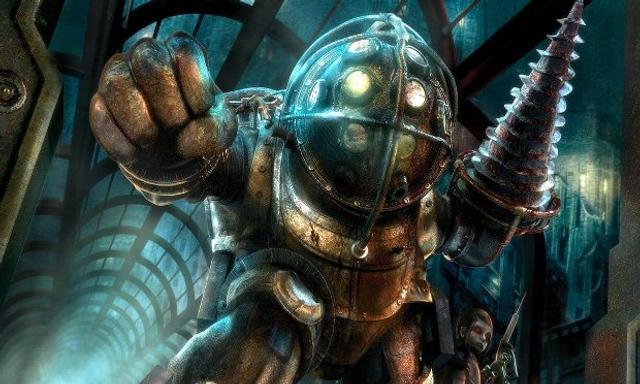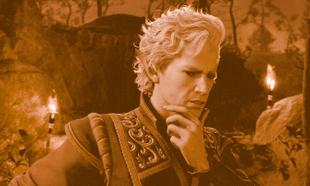Gaming as an artform has been a major debate among journalists and players since the 1990s, and people who believe gaming should be treated with the same reverence as other media artforms such as music or television could do a lot worse than use 'Bioshock' to reinforce their argument.
'Bioshock' shows that gaming could tackle heady, philosophical subjects while also providing exciting action sequences.
Tackling themes of objectivism, hubris, corruption within establishments, and free will, 'Bioshock' is the game that defined the 2000's just as much as 'Halo' or 'Grand Theft Auto'.
The 2010s saw a wave of games tackle complex subjects, but it was 'Bioshock' that showed there was a mainstream audience that wanted some smarts to accompany their shooting.
As the game turns 15 years old, we look back at just how extraordinary and fresh 'Bioshock' was to the world of gaming.
All At Sea
The hook for 'Bioshock' is a strong one - you take control of someone who survives a deadly plane crash in the Atlantic Ocean and seeks refuge in a lighthouse that happens to be home to an elaborate and vast underwater city called Rapture.
Rapture was built on the principles of objectivism, and the game offers a look at a society that was built on Ayn Rand's philosophy.
This was never tried in the real world, so on a base level, the game has a strange and interesting premise to explore.
The intro to 'Bioshock' is among the most shocking and unforgettable video game intros in history, and the first descent into Rapture is video game storytelling at its finest.
'Bioshock' represents the promise of video games as an artistic medium, and was one of the first times video games showed that it can better film and television when it comes to telling deep and engaging stories.
The main appeal of 'Bioshock' is discovering the dark and twisted secrets Rapture has to offer, and in the confines of a video game where you don't have to worry about length or run time, the game is able to inject atmosphere into every nook and cranny.
A unique element of 'Bioshock', at least from an Irish standpoint, is how the game perceives and depicts Irish people.
Depictions of Irish people in media usually depict them as rabble-rousers who are intent on causing crime, but Atlas is a smart and savvy man who can see through Andrew Ryan's deceit.
For a large part of the game, Atlas is a swashbuckling Gabriel Byrne type (indeed, Ken Levine has stated in interviews Atlas is based on Gabriel Byrne's performance in the Coens Brother film 'Millers Crossing') and it is refreshing to see an Irish character in media who isn't permanently drunk and is able to string a sentence together.
Indeed, Atlas is more akin to a Che Guevara type than a foolish Darby O'Gill style character, which makes the late game reveal surrounding Atlas' true identity that much more shocking.
The 'Bioshock' games work incredibly well as rip-roaring first-person shooters, but our perception of real-world history feeding into the world of 'Bioshock' makes the games that much richer.
2013's 'Bioshock Infinite' touches upon themes of American Exceptionalism, and the original 'Bioshock' explores how the American identity became redefined in the Eisenhower era.
The depiction of the Irish in 'Bioshock' reflects how the Irish people were perceived to Americans in the 20th century, and as we see in the likes of 'Gangs Of New York' and 'Titanic', Irish people are treated as hoodlums or thugs in the eyes of Americans.
In 'Bioshock', it is a refreshing turn of pace to see that Irish people are the ones calling the shots, and are able to lead a revolution with strong ideals.
You don't need to be versed in sociology or history to enjoy 'Bioshock', but this rich layer of subtext makes a great game an excellent one.
Who's Your Daddy?
Iconography is a major part of the 'Bioshock' experience, from the Art Deco stylings of Rapture to the designs of the Big Daddys, and helps sell 'Bioshock' as a cosmic gumbo of narrative and gameplay.
The Big Daddy is the face of the franchise, and for good reason, with the striking design one of the very best character designs in a game ever.
2010's 'Bioshock 2' took the wrong lessons by letting you play as one, because the Big Daddy is embolic of the decline of Rapture.
The Big Daddy reflects how Rapture started out as a refuge for the creative mind, but quickly became enveloped by the same problems humanity has been struggling with few years.
Just because a city was started underwater with the best and brightest minds of humanity doesn't mean that we won't face the same problems under the sea as we do on dry land.
This theme is a continuation of 'System Shock 2', the game where game director and writer Ken Levine introduced himself to the world.
The man at the core of the 'Bioshock' experience is Ken Levine.
We have discussed in previous entries of this series how game personalities like Hideo Kojima or Gabe Newell became auteurs in their own right, and with the success of 'Bioshock', Ken Levine became one of a select few who enjoy auteur status within the gaming sphere.
Levine first came to fame as the lead writer for 'System Shock 2'. and in a lot of ways, 'Bioshock' is a spiritual successor to the 2000 game.
Players are thrust into the middle of a strange and eerie environment and are being led along by a mysterious figure that we don't know whether we can trust or not.
The parallels between 'System Shock 2' and 'Bioshock' are striking, and both games are a clear demonstration that Levine is willing to tackle major societal issues in video game form.
The 2010s saw a boom in gaming, and we were given such unforgettable narrative experiences such as 'The Walking Dead', 'Disco Elysium' and 'The Last Of Us', but gaming needed a story that was so timeless and elegant that is set the stage for other games to follow.
2007 was a miracle year for gaming, and 'Bioshock' is the game from that exceptional class of 2007 that still stands head and shoulders above its peers.
On a surface level, 'Bioshock' is an incredibly fun and rip-roaring shooter that allows you to electrocute your enemies and blast through richly-designed environments like an underwater Eroll Flynn.
The last 15 years has seen games open up, and in some cases this has worked exceptioanlly well like 'Breath Of The Wild', but there is a lot to be said for a masterfully-crafted linear experience like 'Bioshock'.
'Bioshock' represents the promise of video games as an art form: it can tell deep, engaging stories in a way that film or television cannot.
A 'Bioshock' film has been attempted at least twice by major Hollywood studios, with Netflix the latest to throw their hat into the ring, but the simple matter is it would take a miracle of adaptation like Greta Gerwig's 'Little Women' to take an 8-hour game with major philosophical themes and make it palpable for mainstream audiences.
'Bioshock' is a singular masterpiece that helped show the world at large that gaming was much more than mindless violence and a past time of frustrated young men, it was an art form that was able to surpass the very best of what Hollywood or the library could offer us.









































































